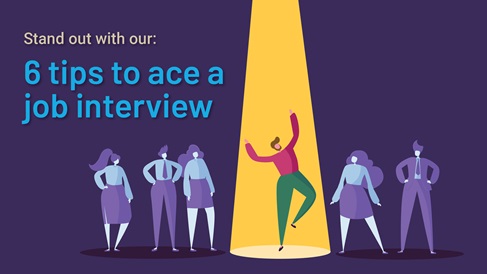
Job interviews can be daunting, but you can reduce your nerves and increase your chances of success if you are prepared.
Here are 6 tips to help you ace your next interview.
1. Review your application and CV
Reviewing your application will remind you of the sorts of things that helped you stand out to your potential employers, and you should be sure to bring those things up in the interview where appropriate. And, if you’re like most people, you probably don’t remember everything you put on your CV, so you’ll want to reacquaint yourself with the details so you can address them if the interviewer raises them, rather than looking at the interviewer blankly, unsure about what they’re talking about.
2. Know the company
This is super important. Never go into an interview knowing the bare minimum about the company. Doing your research and learning the ins and outs of a company’s history, their offerings, their points of difference, their target market and the important people in the company (e.g. the CEO, managing director, etc.) shows that you care and are genuinely interested.
Plus, interviewers tend to ask questions that reveal whether or not you’ve done your homework, so you’ll want to demonstrate that you have.
3. Come prepared with plenty of examples
Interviewers love to ask behavioural questions — i.e. questions that start with “Can you tell us about a time when you…”. So, make sure you mine your experiences so you have good examples of times when you worked in a team, when you worked by yourself (autonomously), when you overcame obstacles, when you dealt effectively with conflict, when you juggled multiple deadlines at once, when you had to go above and beyond, when you had to solve problems and when you had to make difficult decisions.
4. Think about your strengths
Employers will typically ask you about your strengths, and you don’t want to give an answer that makes you sound the same as everyone else they’re interviewing. Think about what makes you unique, and consider your experience and how that shapes what you have to offer.
Don’t be cocky, but do be confident and show the interviewer that if they employ you, they’ll be getting something they won’t get with everybody else.
5. Be honest about your weaknesses
It’s pretty much a given that you’ll be asked about your weaknesses in an interview, and there are two important things to remember in relation to this question: 1. Saying you don’t have any weaknesses isn’t an option, and 2. Your answer has to be an actual weakness, not a strength wrapped up as a weakness. Being a perfectionist isn’t a weakness, and they will have heard that one a million times before, so don’t even try.
Instead, do some self-assessment and consider some things that you’re not so great at and how you might be able to improve. Then, when you present this weakness to the interviewer, include the actions you’re already taking to eliminate it.
6. Ask questions
At the end of an interview, you’ll usually be asked if you have any questions, and it’s not a great look if you don’t. Come prepared with a couple of questions about the specifics of the job itself because it will demonstrate genuine interest. And don’t be afraid to ask questions throughout the interview — it shows that you’re paying attention!
Bonus tip: If you’re looking for inspiration on what sort of questions to ask at the end of an interview, Instagram reels and TikTok has a wealth of videos on this.
Whilst not all hit the mark, when we did some scrolling recently these are some of the questions that stood out:
- ‘Have you been given opportunities to grow outside of your role?’
- ‘What is the team dynamic like?’
- ‘Outside of the people, what is your favorite parts about working at [insert company]?’
- What advice would you give to someone new to this position?’
But remember, whilst having questions prepared is excellent, make sure the ones you ask are relevant to what you’ve been talking about in your interview.
